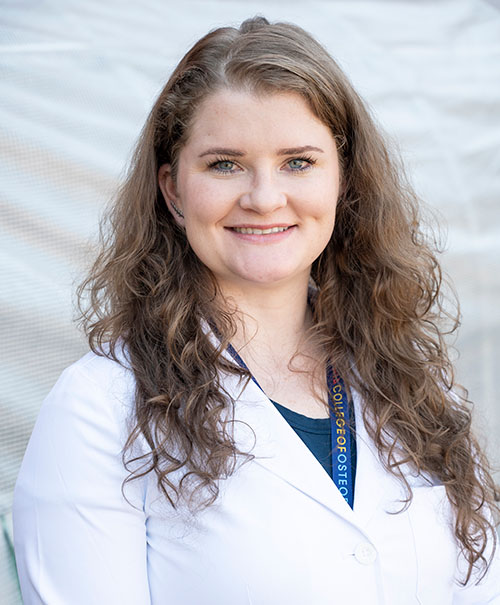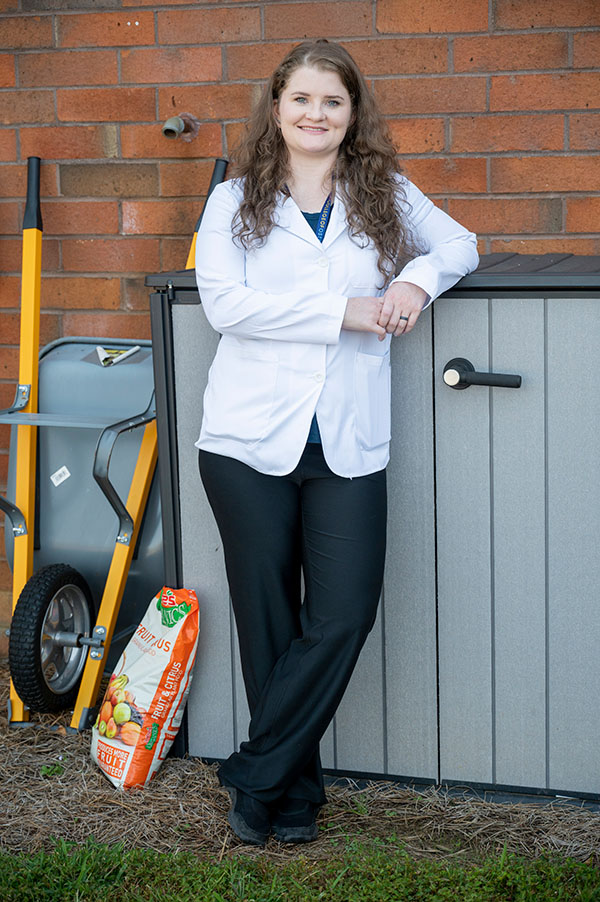Lead Contamination in Soil
Jaci Carithers, MS '22 (DO '26)
October 10, 2022Jaci Carithers earned a Bachelor of Science degree in Biomedical Engineering from
Georgia Tech in 2015. She then earned a Master's degree in Biomedical Sciences from PCOM Georgia in the spring of 2022. In addition, she earned a Certificate of
Advanced Graduate Studies in Organizational Development and Leadership from PCOM Georgia
before matriculating into the Doctor of Osteopathic Medicine program in the fall of 2022.
What are you studying?
Lead contamination in our environment has been a constant presence since ancient times,
but particularly in the past century, it became a major issue with its use in tetraethyl
leaded gasoline as well as in household items such as lead-based paints. At first,
the benefits outweighed the health concerns, with tetraethyl leaded gasoline preventing
the knocking of car engines in the 1920s along with lead-based paints depicting vivid
colors and demonstrating durability and moisture resistance when used on house exteriors.
Not until the 1980s were these lead-based products predominately phased out when it
was found that gasoline exhaust created a thick layer of lead particles in the surrounding
environment, particularly in urban areas where lead poisoning cases increased. In
addition, it was discovered that children who ingested a significant amount of lead-based
paint chips from aging home exteriors had fatal levels of lead concentrated in their
systems. Since then, regulations have been established to control the use of lead,
but remnants of its use can still be found today in the soil in immediate proximity
to these lead-based items and industries.
In graduate school, I became interested in evaluating lead contamination in soil after
meeting with Eri Saikawa, PhD, associate professor and the director of Emory Climate
Talks at Emory University, who performs similar research in the Atlanta area. She
aided in the discovery of the current Westside Lead Superfund Site in Atlanta, where
improperly disposed of lead-based slag (a by-product of smelting) was discovered.
Because of her research, the EPA is currently heading the remediation of the general
vicinity in locations where significant levels of lead contamination were found.
I researched soil lead contamination as part of my General Studies Capstone project
for my masters of science degree and with the help of my classmates was able to conduct
a pilot study by collecting soil samples from households located throughout Gwinnett
County. Through collaborating with Dr. Saikawa, I analyzed soil samples through the
Emory lab's XRF analyzer, a handheld X-ray fluorescent device that uses ionizing x-ray
radiation to identify the elemental composition of materials. Thankfully, the soil
samples collected for the pilot study did not show signs of significant lead contamination
that would warrant further evaluation.
In addition to this research, I performed a literature review on the effects of lead
contamination on human development. This research has helped to shape how I wish to
approach patient care in the future because it has taught me that a patient's health
and wellness can be significantly impacted by their environment. This is especially
important for those exhibiting signs of lead poisoning because, in most cases, the
symptoms are easily confused with other ailments and a diagnosis requires testing
for blood lead levels, which may not be considered routine bloodwork for certain differential
diagnoses.
What prompted you to pursue research?
I pursued research out of general interest to learn more about the human body. It
began with a fascination for lymph node morphology, where I conducted histological
research on various animal lymph nodes at Columbus State University in Columbus, Georgia.
I attended Columbus State as part of the Regents Engineering Transfer Program prior
to transferring to Georgia Tech. This led to my reading through literature on various
aspects of the human body. Whenever an opportunity allowed me to research a subject
further, I was excited to do so.
What experience do you have conducting research?
In addition to the research I conducted at Columbus State, I performed two years of
undergraduate research focusing on the Fontan procedure in the Cardiovascular Fluid
Mechanics Laboratory at Georgia Tech. I presented my findings at the 2014 Pediatric
Research Conference in both a rapid-fire presentation and a poster presentation on
the "Effect of Exercise on Bifurcated Y-graft Fontan Total Cavopulmonary Connection."
The Fontan procedure is the third palliative surgery of three total surgeries to correct
for patients born with single ventricle congenital heart defects. The lab utilizes
medical imaging and previously developed tools to reconstruct patient-specific anatomy
and flow with the goal of analyzing the anatomy and creating surgical planning options
that are suggested to clinical teams for implementation.
What were your responsibilities in the research project?
I was considered the head researcher in the group that later formed after I had initiated
my Capstone research in soil lead contamination. For the completion of the pilot study,
I collaborated with Alexis Katz (DO '24), Philipa Wang (DO '25) and Farmaan Judge
(MS/Biomed '23) under the guidance of Brian Matayoshi, PhD, professor of physiology
in the Department of Bio-Medical Sciences at PCOM Georgia.
What is the broader impact of your research?
I wish to bring awareness to how environmental factors can be a causative issue in
the health and wellness of the patient and can be easily missed or confused with other
diagnoses. I also wish for this research project to spark future environmental health
research-based projects at PCOM Georgia. So far, we have helped the PCOM Georgia community garden initiative with funding thanks to the PCOM Community-Engaged Faculty Research Fellowship. This fellowship also helped to fund our pilot study research and will be utilized
for future projects.
About PCOM Georgia
PCOM Georgia has been serving students and the community for 20 years as a branch campus of Philadelphia
College of Osteopathic Medicine (PCOM), a private, not-for-profit, accredited institution
of higher education established in 1899. Located in Suwanee (Gwinnett County), PCOM
Georgia offers doctoral degrees in osteopathic medicine, pharmacy and physical therapy.
Graduate degrees are offered in biomedical sciences, medical laboratory science and
physician assistant studies. The campus joins PCOM South Georgia in Moultrie in helping
to meet the healthcare needs of the state. Emphasizing "a whole person" approach to
care, PCOM Georgia focuses on educational excellence, interprofessional education
and service to the community. For more information, visit pcom.edu or call 678-225-7500. The campus is also home to the Georgia Osteopathic Care Center,
an osteopathic manipulative medicine clinic, which is open to the public by appointment.
For more information, visit pcomgeorgiahealth.org.
Contact Us
For general media inquiries, please contact the Office of Marketing and Communications
at 215-871-6300 or communications@pcom.edu. Visit our media relations page to view contact information for public relations personnel.
Connect with PCOM Georgia

 Jaci Carithers earned a Bachelor of Science degree in Biomedical Engineering from
Georgia Tech in 2015. She then earned a Master's degree in
Jaci Carithers earned a Bachelor of Science degree in Biomedical Engineering from
Georgia Tech in 2015. She then earned a Master's degree in  I researched soil lead contamination as part of my General Studies Capstone project
for my masters of science degree and with the help of my classmates was able to conduct
a pilot study by collecting soil samples from households located throughout Gwinnett
County. Through collaborating with Dr. Saikawa, I analyzed soil samples through the
Emory lab's XRF analyzer, a handheld X-ray fluorescent device that uses ionizing x-ray
radiation to identify the elemental composition of materials. Thankfully, the soil
samples collected for the pilot study did not show signs of significant lead contamination
that would warrant further evaluation.
I researched soil lead contamination as part of my General Studies Capstone project
for my masters of science degree and with the help of my classmates was able to conduct
a pilot study by collecting soil samples from households located throughout Gwinnett
County. Through collaborating with Dr. Saikawa, I analyzed soil samples through the
Emory lab's XRF analyzer, a handheld X-ray fluorescent device that uses ionizing x-ray
radiation to identify the elemental composition of materials. Thankfully, the soil
samples collected for the pilot study did not show signs of significant lead contamination
that would warrant further evaluation.